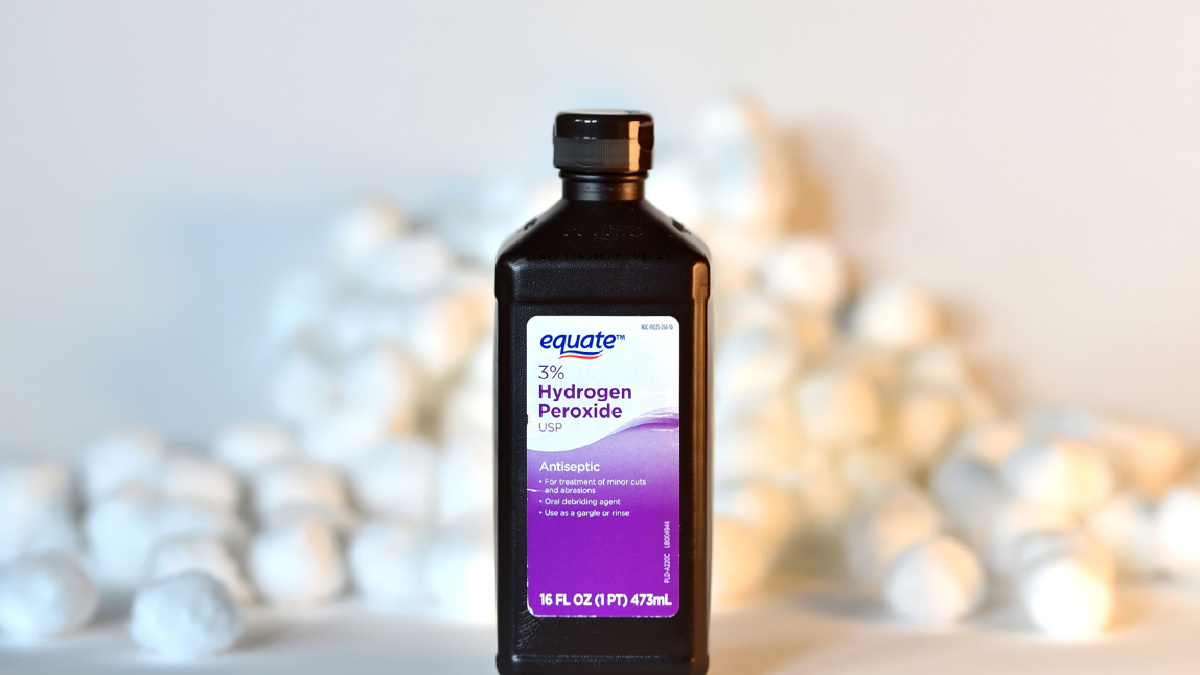Hydrogen peroxide is a chemical compound that consists of two hydrogen atoms and two oxygen atoms. It is a clear liquid that is commonly used as an antiseptic and disinfectant. Hydrogen peroxide is known for its ability to kill bacteria, viruses, and fungi, making it a popular choice for cleaning wounds and surfaces. It is also used in various industries, such as the paper and textile industries, as a bleaching agent.
While hydrogen peroxide can be beneficial for cleaning and disinfecting, it can also be harmful if used improperly. When used on the skin, it can cause irritation, redness, and even chemical burns. It is important to follow proper dilution and application instructions when using hydrogen peroxide on the skin to avoid any adverse effects.
Benefits Of Using Hydrogen Peroxide On Skin
Hydrogen peroxide can provide a range of benefits, including helping to treat acne, reducing hyperpigmentation, and promoting overall skin health. Hydrogen peroxide has antibacterial properties, which can help to kill the bacteria that cause acne and other skin infections. Additionally, it can help to reduce inflammation and redness, making it an effective treatment for acne scars and other types of hyperpigmentation. Finally, hydrogen peroxide can help to promote overall skin health by stimulating the production of collagen, which can help to improve skin elasticity and reduce the appearance of fine lines and wrinkles. Overall, using hydrogen peroxide on the skin can be an effective and safe way to improve skin health and appearance.
Risks And Side Effects Of Using Hydrogen Peroxide On Skin
While hydrogen peroxide is an effective antiseptic for cleaning wounds and disinfecting surfaces, it can also have negative effects on the skin. When applied topically, hydrogen peroxide can cause skin irritation, redness, and dryness. It can also disrupt the natural balance of bacteria on the skin, leading to an increase in acne and other skin issues. Overuse of hydrogen peroxide can even damage the skin’s protective barrier, making it more vulnerable to infection and other irritants.
Additionally, hydrogen peroxide can bleach the skin and hair, causing discoloration and damage. It should never be used on open wounds or near the eyes, as it can cause serious damage to these sensitive areas. While hydrogen peroxide can be a useful tool for cleaning and disinfecting, it should be used with caution on the skin and only under the guidance of a healthcare professional.
How To Safely Use Hydrogen Peroxide On Skin
Hydrogen peroxide is an effective disinfectant that can also be used on the skin, but it must be used with caution to avoid damage. When using hydrogen peroxide on the skin, it is important to dilute it with water to a concentration of 3% or less. Higher concentrations can cause skin irritation, burns, and even permanent scarring. It is also important to avoid using hydrogen peroxide on open wounds or cuts, as it can delay the healing process.
To safely use hydrogen peroxide on the skin, apply a small amount to a cotton ball or swab and gently apply it to the affected area. Avoid applying it to the eyes, mouth, or any other mucous membrane. After applying, rinse the area with water and pat dry. If you experience any redness, itching, or swelling, discontinue use and consult a healthcare professional. By following these guidelines, you can safely use hydrogen peroxide on your skin to help prevent infection and promote healing.
Alternatives To Hydrogen Peroxide For Skin Care
There are plenty of alternatives to hydrogen peroxide for skin care. One option is witch hazel, which is a natural astringent that can help reduce inflammation and redness. Another alternative is tea tree oil, which has antibacterial properties and can help soothe acne-prone skin. Additionally, using gentle cleansers and moisturizers can help keep the skin healthy and balanced without the need for harsh chemicals like hydrogen peroxide.
Hydrogen Peroxide For Acne Treatment
Hydrogen peroxide has been used for decades as a treatment for acne. It is a powerful oxidizing agent that kills bacteria and reduces inflammation. Hydrogen peroxide can be applied topically to the affected area using a cotton ball or Q-tip.
It is important to dilute the hydrogen peroxide before applying it to the skin as it can cause irritation and damage if used in its concentrated form. The recommended dilution is 3% hydrogen peroxide mixed with equal parts water. Hydrogen peroxide can also be used as a spot treatment for individual pimples by applying a small amount directly to the pimple with a Q-tip. It is important to avoid getting hydrogen peroxide in the eyes, nose, or mouth, as it can cause irritation and damage to these sensitive areas. Overall, hydrogen peroxide can be an effective and affordable option for treating acne when used properly.
Hydrogen Peroxide For Skin Lightening
Hydrogen peroxide is also said to be an effective agent for skin lightening. To do this, try to dilute it with water and apply it to the affected area with a cotton ball or swab. It is important to avoid contact with the eyes and to rinse the skin thoroughly after use. While hydrogen peroxide can be effective for skin lightening, it is important to consult with a dermatologist before using it, especially if you have sensitive skin or a history of skin allergies.
Is Hydrogen Peroxide Safe And Effective For Skin Care?
In conclusion, hydrogen peroxide can be safe and effective for skin care when used properly and in appropriate concentrations. It has been shown to have antimicrobial and anti-inflammatory properties that can help treat acne, wounds, and other skin conditions.
However, it is important to use hydrogen peroxide in moderation and avoid using it on sensitive areas of the skin or open wounds. It is also important to dilute it with water before applying it to the skin. Overall, while hydrogen peroxide can be a useful addition to a skincare routine, it is important to exercise caution and seek professional advice if necessary.





